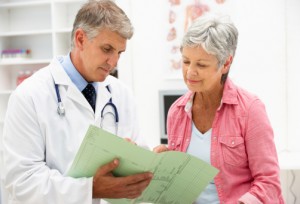

 Rheumatoid arthritis was found to take on a milder form in women who experience earlier menopause, according to research.
Rheumatoid arthritis was found to take on a milder form in women who experience earlier menopause, according to research.
The study involved 134 rheumatoid arthritis cases identified by four local and national registers that were part of the community-based health survey.
For the study, researchers identified 134 rheumatoid arthritis cases collected by four local health registries. A retrospective structured review of the medical records looked at the information on the use of disease-modifying antirheumatic drugs (DMARDs), erosions on radiographs, rheumatoid factor (RF) status, and disability measured by using the health assessment questionnaire (HAQ). Hormonal predictors like breastfeeding history, history of oral contraceptive use, and menopausal age were also analyzed.
The participants were grouped in one of three clusters: severe RA, mild/moderate RF-positive RA, or mild/moderate RF-negative RA. The researchers found a significant difference in cluster distribution between those who experienced early menopause compared to those who experienced menopause after the age of 45.
The researchers found there was a larger number of women in the mild/moderate RF-negative RA in the early menopause cluster. The severity of rheumatoid arthritis wasn’t shown to be affected by the oral contraceptive use and history of breastfeeding.
The researchers concluded that early menopause was associated with a milder version of rheumatoid arthritis. The hormonal changes associated with this period in a woman’s life may influence the pathways that are different from pathways that lead to a severe, progressive form of RA.
Research on menopause and rheumatoid arthritis is often conflicting and unclear. As rheumatologist Alana Belfield said, “There is no clear evidence that menopause positively or negatively affects rheumatoid arthritis.”
Other studies have shown that women who develop early menopause are more likely to experience rheumatoid arthritis later on in life. This may be explained by the changes in the levels of estrogen, a female sex hormone, as the rates of RA are much higher among women than men.
Pregnancy is the time when the female body becomes flooded with estrogen and it is known to suppress rheumatoid arthritis symptoms. After delivery, once the estrogen levels return back to normal, women often report that their RA symptoms come back – in some cases, more severe than before.
For these reasons, sometimes taking estrogen therapy can help alleviate RA symptoms. But the most natural way to address your rheumatoid arthritis symptoms is through exercise, which has been shown to improve menopause symptoms as well.
Other benefits of exercise include maintaining bone density, increasing muscle mass, and improving sleep – all important aspects of aging.
In the meantime, additional research is required to better understand the link between rheumatoid arthritis and menopause.
Rheumatoid arthritis vs. osteoarthritis, differences in symptoms, causes, and treatment
Rheumatoid arthritis and osteoarthritis are just two of the many different types of arthritis. Although there are many commonalities between these conditions – joint pain being a large one – there are important differences between the two that can aid in determining a proper treatment. Continue reading…
In postmenopausal women, even light physical activities are effective against weight gain
Physical activity has proven to be an effective way to combat weight gain in premenopausal and postmenopausal women– even in moderate amounts. Menopause signifies the end of a woman’s menstrual cycle as well as fertility. During this time the ovaries no longer produce estrogen or progesterone – two key female hormones. Continue reading…
Sources:
https://arthritis-research.biomedcentral.com/articles/10.1186/ar4021
http://www.everydayhealth.com/rheumatoid-arthritis/living-with/does-menopause-worsen-rheumatoid-arthritis/
Copyright © www.orthopaedics.win Bone Health All Rights Reserved